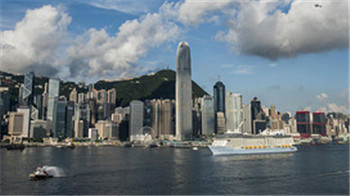
There is an irony to the fact Hong Kong’s economy may enjoy a temporary cushion from the effects of rising US interest rates because of China’s bungled summer renminbi devaluation.
具有讽刺意味的是,由于中国内地今年夏季的人民币贬值举措搞砸,香港经济可能会获得少受美国加息影响的暂时缓冲。
The territory, with its currency pegged to the dollar and its future tied to China, is trapped between the conflicting forces of tighter US policy and the slowdown in the mainland.
港元盯住美元,但香港的未来与中国内地联系在一起,这个特别行政区夹在美国货币政策收紧和内地经济放缓这两股相互冲突的力量之中。
Its economy is slowing, yet yesterday, the peg obliged the Hong Kong Monetary Authority, worried about a surge in outflows to the US, to match the Federal Reserve’s quarter-point rate rise.
香港经济正在放缓,但昨日港元联系汇率制迫使香港金管局(Hong Kong Monetary Authority)跟随美联储(Fed)加息25个基点,担心外流到美国的资金飙升。
Last week Norman Chan, HKMA chief executive, was blunt about his worries when he told a gathering of economists in the city to be prepared for a “period of capital outflows, rising interest rates and slower growth”.
上周,香港金管局总裁陈德霖(Norman Chan)对于这种担忧直言不讳,他在香港的一个经济学家会议上表示,要为“一段时期的资本外流、加息和增长放缓”做好准备。
Frederic Neumann, co-head of Asian economic research at HSBC, said the slowdown was inevitable. “We had the best of all worlds for years; we had very low US rates and a boom in China,” he said. “Now China is slowing and the Fed is raising rates, so we get a double whammy for Hong Kong.”
汇丰银行(HSBC)亚洲经济研究联席主管范力民(Frederic Neumann)表示,经济放缓是不可避免的。“我们曾在多年期间两头得利;我们拥有美国的超低利率,也有内地经济的繁荣,”他表示,“如今,内地经济在放缓,美联储在加息,因此对于香港而言,我们遭遇了双重打击。”
Property prices are already feeling the pressure, slipping 6 per cent in the past three months and forcing developers to offer ever greater sweeteners to help maintain prices.
房地产价格已感受到这种压力,过去3个月,香港房价下跌6%,迫使开发商提供更大优惠力度,以帮助维持房价。
Last time the Fed began a rate-rising cycle in 2004, Hong Kong enjoyed low debt and was on the up after the Sars virus crisis, helped by being viewed by investors as a proxy for China.
美联储上一次加息周期始于2004年,当时香港享受着较低的债务,同时在非典(Sars)危机过后,经济处于上升势头,得益于香港被投资者视为投资中国内地的替代者。
But debt has soared, with private sector borrowing at 200 per cent of gross domestic product, according to UBS.
但根据瑞银(UBS)的数据,香港债务自那以来飙升,私营部门借款与GDP之比达到200%。
“This isn’t going to be like 2004,” said Duncan Wooldridge, economist at UBS. “The US rate cycle, China’s business cycle and [weakening] Chinese renminbi are not favourable for Hong Kong.”
“现在的情况与2004年不同,”瑞银经济学家吴德恺(Duncan Wooldridge)表示,“美国的利率周期、中国内地的商业周期以及人民币(贬值)都对香港不利。”
The city’s economy may still receive a temporary reprieve if bank rates are slow to rise, which looks likely after China’s shock devaluation in August triggered a rush to switch renminbi for Hong Kong dollars.
如果银行利率上涨缓慢(在中国今年8月人民币贬值引发投资者纷纷将人民币换成港元之后,这一点看上去有可能出现),香港经济仍可能获得暂时的喘息空间。
That pushed excess liquidity, in the form of aggregate bank balances, to HK$426bn, the highest since 1997. Analysts at ANZ Bank estimate liquidity, now HK$391bn, would have to fall to $285bn before local banks need to raise rates to attract funds.
这推动香港的过剩流动性(其形式为银行总结余)达到4260亿港元,为自1997年以来最高。澳新银行(ANZ)分析师估计,在本地银行需要加息吸引资金之前,目前3910亿港元的流动性必须降至2850亿港元。











